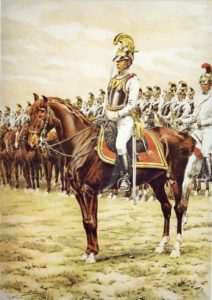Did you know? – A Hungarian musician composed the national anthems of Uruguay and Paraguay
Ferenc József Debály (Fransisco José Debali) started his carrier as a military musician in the imperial army of the Habsburg Empire. Thanks to his adventurous nature, he settled down in the capital city of Uruguay – Montevideo. He joined the command of the newly born state as a conductor and composed its national anthem after the civil war. Later he was requested to do the same for Paraguay.
Debály was born in 26th July 1791. We still do not know where he came to the world accurately. Some sources say, he was born is Kajántó (Transylvania), others say he was from Oltenia (Romania), and some say he was born near Pest-Buda. What we know for sure is, that as the son of a military musician (who was one of the pupils of Joseph Haydn), his talent was immediately discovered. From the age of fourteen, he played in the Habsburg imperial army until 1820, as an oboe player.

Photo:
https://hu.wikipedia.org
Besides he also had the honour to play in Hofburg (Vienna) – in the resident of Emperor Francis I. After his service in the army, he started his studies in Leipzig and finished in Vienna as a conductor. He moved to Genova and became a conductor of the Sard-Piedmontese army – first he served in a Piedmontese cavalry regiment and then he conducted the band of the royal guards. He married Madalena Magnascó there
and in 1838, they travelled together to the New World.
Their original destination was Brazil, but the ports were closed, both in Rio de Janeiro and Santos because of yellow fever. So they were forced to land in Montevideo instead. After destiny brought him there, Debály decided to try his luck in Uruguay, that was at the brink of civil war at that time. First, he played in the local band, Caja de Comedia. Then, as an excellent musician and conductor, he joined the army and conducted the military orchestra of President Fructuoso Rivera as maestro mayor. The Blancos party, helped by Argentinian troops tried to remove him and gain power in the Uruguayan civil war, between 1839-1851.
Debály served during the entire wartime in the army and started composing his own musical pieces, inspired by the brave and heroic vocation of the people of Uruguay. This was the time when he reached the top of his career. After the glorious victory at Cagancha, he composed and published his masterpiece “Himno a Cagancha” which rapidly became very popular in the country, and soon it was attached to the poem of Francisco Acuña de Figueroa:
“Orientales, la Patria o la Tumba” (Easterners, the Country or the Tomb) – this way it was officially accepted as the national anthem of Uruguay on 26th July 1848 – on Debály’s 57th birthday.
This was the time when the widely respected composer met Guiseppe Garibaldi and they became good friends. Garibaldi was the leader of the Uruguayan navy at that time and helped President Rivera during the civil war. Later he sailed back to Europe and fought in the 2nd Italian War of Independence commanding his “red-shirt” army – many Hungarian revolutionary soldiers served under him after the Hungarian Revolution and Freedom Fight was broken.
After composing the national anthem of Uruguay, which is the longest national anthem of the world, Debály became very popular and widely respected. Thanks to his fame, he was requested to compose the national anthem of Paraguay. Figueroa wrote the lyrics this time as well and Debály provided the melody for that. Another masterpiece was born.
Ferenc József Debály died in the year of 1859. The street, where he lived in Montevideo is still preserving his name. The Hungarian musician and conductor composed 143 musical pieces (marches, dances, symphonies, concertos, overtures etc.) and made his name remembered in the history of South-America.







